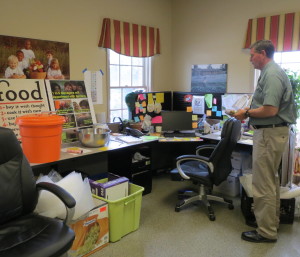Chester County nonprofit’s plethora of produce, volunteers outgrows space
By Kathleen Brady Shea, Managing Editor, The Times

Larry Welsch, executive director of the Chester County Food Bank, surveys some of the current office space, which features overflow storage on the floor.
When the Chester County Food Bank rose from the ashes of its bankrupt predecessor in 2009, it did so with an ambitious goal: to end hunger rather than just assuage it.
Since that time, its growth has amazed even its organizers. In September 2010, the Food Bank, a clearinghouse for the county’s food cupboards, moved into a complex in East Brandywine Township, where it expanded its operations. In addition to adding flash-freezers and dehydrators to extend the growing season, the Food Bank grew its existing programs and added a host of new ones.
Now, less than four years at a facility expected to last for 10, mathematics has dictated otherwise, said Larry Welsch, executive director of the independent nonprofit. A sampling of numbers that don’t compute: 14 parking spaces divided among nine employees plus 3,300 volunteers, or one small refrigerator and last season’s 600,000 pounds of fresh produce.

The Chester County Food Bank’s new facility in Uwchlan Township offers four times the size of its current warehouse in East Brandywine Township.
“The Chester County Food Bank is not like most food banks. We’re not the old model: ‘cans in, cans out, ’” said Welsch. Instead, the Food Bank, led by real-estate entrepreneur Robert McNeil, recognized that the county’s agriculture was an invaluable resource, said Welsh.
Welsch said the Food Bank began looking for a new location two months ago and found one in Uwchlan Township that would quadruple its size to about 36,000 square feet. It also identified a prospective buyer for the old space, and is now under a tight deadline to relocate by July 31, he said.
“We’re just going to get it done,” stated Doug Howe, the contractor orchestrating the retrofitting of a former packaging plant in the Eagleview Corporate Center. The biggest changes are the addition of a 45-by-45-foot refrigeration space and a 45-by-25-foot freezer section, Howe said as busy workers scurried around him.
Anne Shuniak, community outreach and marketing director for the Food Bank, said the office area in the building will remain relatively unchanged. “We’re using the same desks and everything that’s here,” she said, adding that the space itself will be a luxury. “I’m not sure we’re going to know what to do with it.”
Welsch said demand surpassed the existing equipment some time ago, and the new facility, which will include a 19-by-70-foot staging area, will enable the Food Bank to continue implementing its new programs, many of which are offshoots of old ones.
For example, the gleaning program, started in 1996 by state Sen. Andy Dinniman, is based on the Biblical description of scavenging for food left in harvested fields. Some farmers’ crops are earmarked for the Food Bank while others make their leftovers available to be picked by traveling groups of volunteers. Welsch said the success of gleaning spawned the “raised-bed” program, in which local churches, businesses, schools or residents grow produce for the Food Bank.
As that effort flourished – 546 gardens at 129 sites, including 49 schools, last year, up from a total of 25 in 2009 – the Food Bank launched a greenhouse initiative, providing schools with unheated “high tunnels” so that students can grow food almost year-round for their cafeterias. “We’re looking for any way to grow our own resources … and to encourage healthy eating,” Welsch said.
He said Food Bank workers developed curriculums for elementary- and middle-school students to reinforce the concept of good nutrition, and have worked with school staff to introduce healthier food selections for students. Squash bars were a winner during a taste test, Welsch said. The Food Bank also created a school backpack program so that students eligible for free or reduced lunches could take healthy food home over the weekend, and it has sponsored cooking classes.
Welsch said even though the economy shows signs of improvement, he has not seen a slowdown in need. At the same time, it’s difficult to gauge, he said, because the Food Bank has widened its mission to encourage healthy eating for all children, not just the underprivileged. What he has observed in one of the nation’s most affluent counties is an increase in those willing to reach out to those less fortunate. “It’s incredible the way people have stepped up,” he said. “I’m absolutely thrilled with this county and the response we’ve received.”
The outreach ranges from individual families who drop off excess crops from home gardens to massive corporations such as QVC, Wegman’s, Endo Health Solutions, Inc., and Vanguard, which have instituted large-scale programs, and smaller businesses like Waterloo Gardens, which put in raised beds for the Food Bank. “It’s a community effort,” said Welsch. “It’s amazing what we’ve been able to accomplish in 3 ½ years.”
In the midst of the relocation frenzy, Welsch said the Food Bank remains buoyed by the news it received a month ago from the University of Pennsylvania. A study the university performed ranked the Chester County Food Bank sixth nationwide in the percentage of fresh food it disperses. “Twenty-two percent of the 2,000,000 pounds of food we distributed was fresh,” Welsch said. “That was great to hear; of course, we’re always working to make it higher.”






